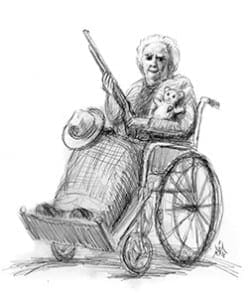Finding grace in surprising places
By LORRAINE V. MURRAY, Commentary | Published January 23, 2014
 We drive down a narrow road past a muddy lake to arrive at a building that resembles a sprawling Southern mansion complete with pillars and porch.
We drive down a narrow road past a muddy lake to arrive at a building that resembles a sprawling Southern mansion complete with pillars and porch.
We park and take the elevator to the second floor. As we walk down the hall, I peek into the rooms noticing that many are cheerily decorated with brightly crayoned scenes drawn by children and taped to the walls. Still, some residents sit with blank expressions on their faces—and stare mutely when I greet them.
This is the dementia ward of a nearby nursing home—a place most people avoid. It is little wonder since the question haunting every visitor is the unspoken one: What if someday I wind up here too?
My husband and I soon arrive at my mother-in-law’s room and peer inside anxiously because we never know what to expect. Some days she’s quite placid, but other times we find her rolling down the hall in her wheelchair wreaking havoc by threatening to shoot the other residents.
Today she’s cozily nestled in bed wearing one of the sweaters we gave her, the pink burgundy one with snowmen on the bodice. We’ve brought her some treats—chocolate truffles and rum balls—and she selects a favorite before launching into storytelling.
Even if her memories of more recent events are jumbled, she likes to talk about old times in Rome, Ga., where she grew up in the countryside. Some of her favorite tales are about her grandmother—Gran—who was a deft hand with a gun.
“No one could outshoot her,” she says proudly.
One day Gran heard something outside and thought it was a robber, so she started shooting right through the walls of the house—and later discovered she’d hit some poor unsuspecting cat. Another time Gran got so upset over a wrestling match that she grabbed a baseball bat and threatened to smash the TV—until someone assured her the people weren’t really inside.
At times my mother-in-law confuses her son—my husband—with his younger brother, with her own brother and with her husband who died long ago. Still, she manages to spin darkly comical stories that remind me of Flannery O’Connor’s tales about gruesome events happening way out in the middle of nowhere in the Deep South.
It seems Gran had “second sight,” and people would ask her to tell their fortunes. “She could predict their deaths,” my mother-in-law boasts.
Then my mother-in-law confides that her own daughter—who died three years ago—recently came to visit.
“She looked good. She must be enjoying heaven. She waved at me and then she was gone.”
After a moment she adds, “I told her to go visit your house.”
When my mother-in-law first came to live at the nursing home, I dreaded visiting her. It was hard to see how much she had changed—from a witty and articulate retired schoolteacher to a feeble and confused person with unpredictable mood swings.
But then a friend helped me. “Look beyond her failing body and wandering mind to see Christ in her,” she wrote. “Then you need not be sad, for you will know she is beautiful just as she is.”
Today we notice my mother-in-law has hidden beneath her comforter a fuzzy pink stuffed bear with tiny red hearts on its paws. She happily reveals that a nametag was added to the bear recently—“so it won’t get stolen.”
In many ways, she has adapted well to this environment. She enjoys the food, particularly the new potatoes that the cook makes especially for her. She also talks excitedly about a party she plans to host, which will require a giant bottle of Mount Gay rum, “the best kind,” so she can treat the residents to cocktails. As we’re leaving, she asks my husband for a cowboy hat—just like his—for the big day.
The nursing home will never be my favorite place to visit, but the more we come here, the less I dread it. After all, even if the facts of her stories are garbled, it’s clear my mother-in-law loves her audience.
There is no way this diagnosis could ever be considered fun for patients or family, but every so often out of the darkness of endless worry there come moments of light and humor. And gradually I’m learning that it is only through accepting whatever life hands us—the good, the bad and everything in between—that we can discover grace and beauty anywhere—even in the dementia ward.